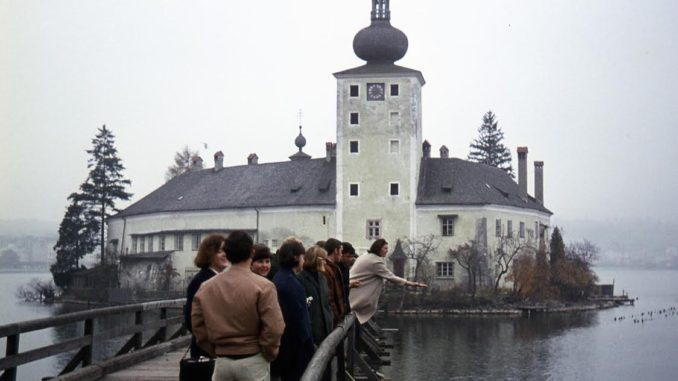
By Catherine Cinguina
With the assassinations of Martin Luther King Jr. and Robert F. Kennedy, anti-war protests and Nixon’s ascension to the presidency, 1968 was arguably one of the most politically and socially tense years in American history.
It was during this fraught time, when Europe was still divided by the Iron Curtain, that 25 Lewis & Clark students went on a study abroad trip to Austria together and formed a lifelong bond. Yet their four years at LC would lead them down entirely different paths.
One member of the group, David Grube, would eventually “fall in” with the pre-med students and go on to become a doctor. Another, Bruce Lamott, became a teacher and a self-described “draft dodger,” receiving his PhD in Music from Stanford. Their 1968 study abroad trip to Austria played a huge role in their career decisions.
50 years later, 15 members of the original group will be returning to Austria.
Grube was born in Alaska and had never even visited LC when he decided to enroll in 1965. Grube intended to either study music or become a priest. Likewise, Lamott, born in Walla Walla, Washington, was initially attracted to LC for its Presbyterian association, which suited his conservative personality.
Grube described the atmosphere on campus during 1968 as “problematic.” Not only were students protesting the Vietnam War, they also protested the building of the Agnes Flanagan Chapel.
Some of the students had initially been drawn to Austria for the immense cultural history of Vienna. Lamott and Grube and other self-described “culture vultures” especially enjoyed the 75 cent standing seats at the National Opera House. New Year’s Eve was memorable as the opera house would put on Johann Strauss’s Die Fledermaus annually.
While Lamott described 1968 as the “most difficult year to be a teenager,” traveling to Austria was no way to escape political and social strife. Part of their semester trip to Austria was spent with host families in the countryside and small towns, with the host families from the cities and families from the countryside getting together at a local discotheque called Georgen to hear the latest hits such as “Hey Jude.”
However, their homestays were a stone’s throw away from Communistcontrolled Hungary and Czech Republic. On weekends, they sometimes visited Yugoslavia on the other side of the Iron Curtain.
“Police were with you all the time … undercover spies were following you,” Grube said. The group was unable to visit the Czech Republic because a young man had burned himself at a public square in Prague to protest communism.
Despite the unusual circumstances surrounding their trip, what is most unusual about the 1968 student trip to Austria is the bond the students formed that has spanned decades.
During the winter months in Austria, the group was able to form a familial bond in order to look out for each other. Grube discusses the students helping each other through depression and homesickness. The older and more experienced students ended up leading the younger kids, some of whom were incoming freshmen, a dynamic which Lamott describes as “a mix between ‘Party of 5’ and ‘Lord of the Flies.’”
One of the most memorable moments of the trip for Grube was the group’s visit to a zoo in Salzburg. The animals weren’t in enclosures as they are today, or surrounded by moats; they were in cages that you could easily walk up to. Grube, along with others on the trip, watched a lion, “a king of the jungle, walking back and forth, back and forth.”
But Grube happened to be standing in the perfect spot to be directly hit by a “firehose of cat urine” as the lion sprayed those standing behind him. Being unfamiliar with the “physiology of cats,” he had not anticipated this at all. Stinking and soaking wet, Grube had to return to the hotel on a city bus while citizens of Austria crowded on the opposite end of of the bus, some even leaving to escape the smell.
50 years later, the students from this trip get together in Portland every five years. They’ve gone on to become teachers, businessmen and women, directors of museums, heads of hospitals and priests.
The trip to Austria in 1968 influenced Grube and Lamott in numerous ways. For Grube, Austria became an important place in his life. All of his children have lived there, and he has returned 10 times. For Lamott, it proved to him that he should change his major to music and would lead him down an entirely different professional path.
For many of the students who had never been outside of the country, they discovered how entirely different and similar other countries are to America. As Grube says, everyone has “moms and dads and brothers and sisters. People need to work and people need to eat.”
Through the relationships they formed with each other and the good and bad choices they made (such as standing too close to a lion), these LC students changed the course of their futures together.
Subscribe to the Mossy Log Newsletter
Stay up to date with the goings-on at Lewis & Clark! Get the top stories or your favorite section delivered to your inbox whenever we release a new issue.

Coming soon: the story of the 1967-68 Germany group’s 50th anniversary return via river cruise. We had an extraordinary time!
It was a wonderful trip, leaving great memories and great friends. I believe it was the first trip abroad for all of us. That we are still so tight is a testament to our experiences together.